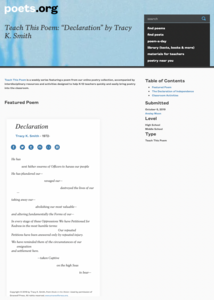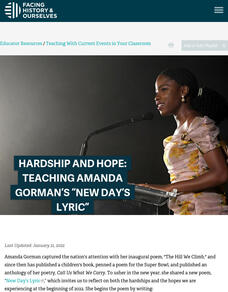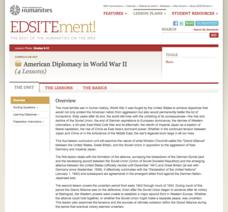University of North Carolina
Remembering Martin Luther King, Jr.
After reading the article "Kings Dream Everyday," class members conduct a Socratic seminar discussion of Martin Luther King's contributions to the civil rights movement. They then read and respond to a passage from Michael Eric Dyson's...
Albert Shanker Institute
The March on Washington Logistics Then and Now
I have a dream ... that all pupils will be able to organize a march of their own after learning about how Bayard Rustin organized the 1963 March on Washington for civil rights. Young reformers work collaboratively examining informational...
Albert Shanker Institute
Who Was Bayard Rustin?
Who was Bayard Rustin? Pupils analyze a series of primary source documents to learn about this important figure in the civil rights movement. The lesson contains a short film to watch along with guiding questions and other resources...
C-SPAN
Presidential Candidate Firsts
Hilary Clinton may have been the first woman to run for president on a major party ticket, but she was only one example of an historic candidacy. Class members use video clips curated from C-SPAN to examine historical firsts in...
Roy Rosenzweig Center for History and New Media
The Revolutionary Times as Seen Through the Eyes of Women
The role of women before and during the American Revolution changed dramatically. To gain an understanding of these changes, middle schoolers analyze primary source documents, including letters from women that supported the patriot cause...
Simon & Schuster
Classroom Activities for Narrative of the Life of Frederick Douglass, an American Slave
The Narrative of the Life of Frederick Douglass is the focus of three activities designed for readers of the autobiography. First, class members deconstruct the title to understand Douglass's purpose in writing. Next, scholars examine...
Newseum
Civil Rights: Turning Points
As part of a civil rights movement study, groups select an event from an interactive timeline that they feel marks a turning point in the struggle. After collecting evidence to support their choice, the teams develop a multimedia...
Academy of American Poets
Teach This Poem: “Declaration” by Tracy K. Smith
Tracy K. Smith's erasure poem "Declaration" challenges scholars to use their noticing skills to make connections between an engraving entitled "The Declaration of Independence" and Smith's poem. Class members record observations and...
K20 LEARN
LBJ and Voting Rights
Challenges to voting rights is not a new thing. Using President Lyndon B. Johnson's 1965 "The American Promise" speech on voting rights as a starting point, young historians research current voting rights laws and challenges.
Learning for Justice
Mary Church Terrell
Excerpts from an 1898 speech by civil rights activist Mary Church Terrell offers young scholars an opportunity to investigate how Black American women fought for civil rights long before Rosa Parks and the civil rights movement of the...
C3 Teachers
Emancipation: Does It Matter Who Freed the Slaves?
Scholars generally agree on the emancipation of enslaved people in the United States. This inquiry-based lesson asks high schoolers to consider more than the claims of who freed the enslaved people but the significance of the issues...
North Carolina Consortium for Middle East Studies
Journey of Reconciliation, 1947
After examining the Jim Crow laws and reading primary source materials about the 1947 Journey of Reconciliation, class members create historical markers that honor riders and their journey.
Maryland Department of Education
The Concept of Diversity in World Literature Lesson 4: Proverbs
"Eneke the bird says since men have learnt to shoot without missing, he has learnt to fly without perching." As part of their study of Things Fall Apart, class members read Paul Hernadi and Francis Steen's essay, "The Tropical Landscapes...
Facing History and Ourselves
Why Little Things Are Big
Often our decisions are impacted by a fear of how others see us. That's the big idea in a two-day lesson that asks how false assumptions, how our fear of how others may see us, impact how we act. After watching a video about such a...
PBS
Keep Your Head Up | Black America Since MLK: And Still I Rise
Change may be slow in coming, but things do change. Oprah Winfrey and Black Entertainment Television CEO, Robert L. Johnson, discuss the opportunities available to them due to the efforts of Dr. Martin Luther King, Jr. and other civil...
Facing History and Ourselves
Hardship and Hope: Teaching Amanda Gorman's "New Day's Lyric"
Class members come together to study Amanda Gorman's poem "New Day's Lyric." After a close reading of the poem, learners watch a video of Gorman reading her poem, and then craft additional lines for the poem where they offer suggestions...
Academy of American Poets
Voice
Four lessons make up a poetry unit that introduces high schoolers to spoken and written poetry. Class members also examine poems as social commentary and connect these poems to various novels and plays. A great way to incorporate poetry...
EngageNY
Identifying Supporting Reasons and Evidence for an Opinion: Exploring Why Jackie Robinson Was the Right Man to Break the Color Barrier (Promises to Keep, Pages 26–29)
Breaking barriers is not an easy thing to do. Scholars read a section in Promises to Keep and summarize how Jackie Robinson broke the color barrier in baseball. They write the gist of the passage in their journals and then complete a...
Lehigh University
Glory (1989) - Should it be Shown in Class?
This is a fantastic activity that prompts learners to think like educators and consider the value of a historically based film beyond just the accuracy of information. Your young historians will work in groups to do a close reading and...
Mr. Roughton
Pawn Stars: Africa
What element was worth more during the growth of empires in West Africa: gold or halite? After examining various pieces of evidence of primary and secondary source documents placed around the room, your class members will each make a...
Curated OER
Who Freed the Slaves During the Civil War?
Pose the question to your historians: who really freed the slaves? They critically assess various arguments, using primary sources as evidence. In small groups, scholars jigsaw 5 primary source documents (linked), and fill out an...
National Geographic
Exploring Modern Human Migrations
Using maps, images, websites, and handouts, learners work to understand the nature of human migrations. They compare and contrast human migration from the past to the present, identify causes for migration, and trace migration routes on...
National Endowment for the Humanities
People and Places in the North and South
North and South: two opposite directions and two opposite economic and social systems in time of the Civil War. Pupils peruse census websites and primary source photographs to understand what life was like for the everyday person before...
National Endowment for the Humanities
American Diplocmacy in World War II
The end of World War II saw the world deeply changed over the last few years. Four thorough lessons explore post-war Europe, America, and Asia through reading assignments and discussion questions about the Grand Alliance and the signing...
Other popular searches
- West African History
- African American History Month
- African History South Africa
- Ancient African Civilizations
- African History Month
- Dance History African
- South African History
- African History of Humans
- African History and Roots
- African History Research
- African History Lesson
- African History Western

























